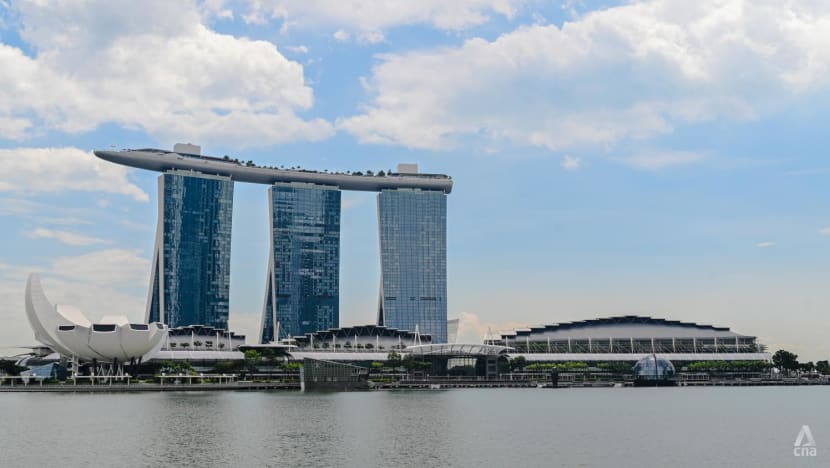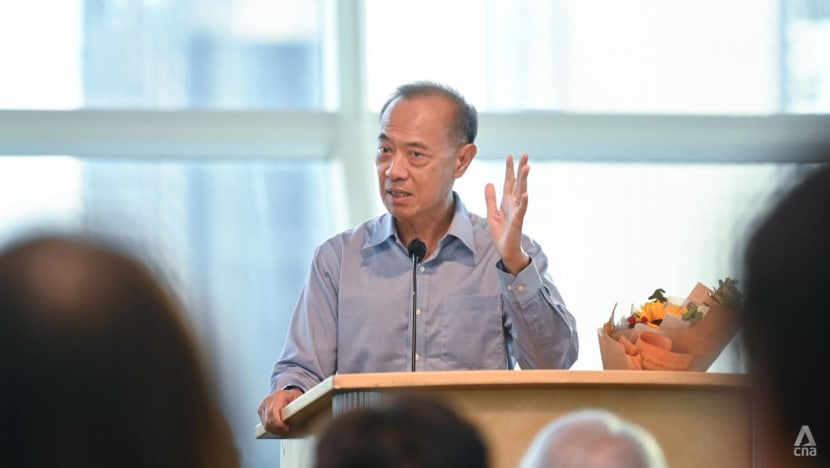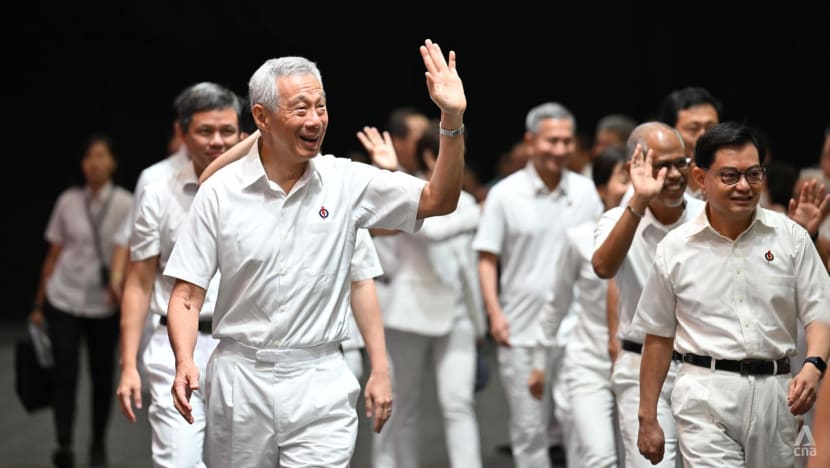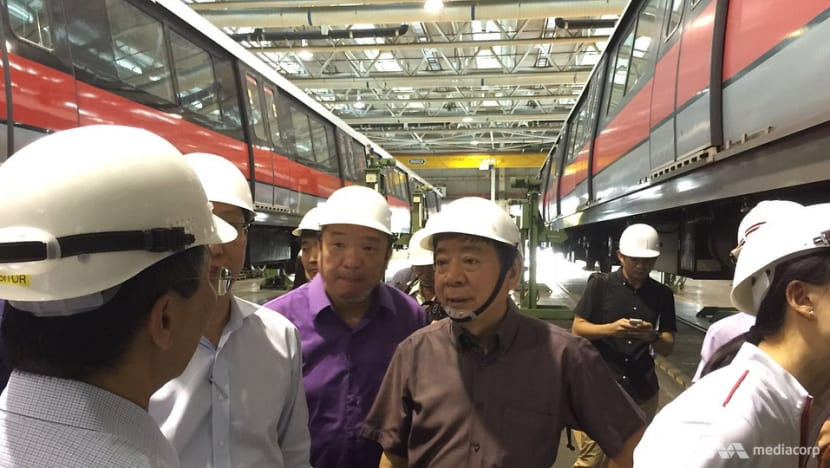From Oxley Road to integrated resorts: How PM Lee handled critical moments in the last two decades
Away from the public eye, Prime Minister Lee Hsien Loong gets directly involved in data analysis and often seeks multiple perspectives before making decisions, past and present members of his Cabinet tell CNA.

Prime Minister and People's Action Party secretary-general Lee Hsien Loong speaks at the PAP awards and convention on Nov 5, 2023. (Photo: CNA/Jeremy Long)

This audio is generated by an AI tool.
SINGAPORE: During his 20-year tenure as prime minister, Mr Lee Hsien Loong has steered the country through key junctures that have shaped Singapore’s social, political and economic trajectory.
Behind the scenes, Mr Lee often listens to multiple perspectives before making decisions. He has a pragmatic approach to problem-solving and gets involved in data analysis, past and present members of his Cabinet told CNA.
The Prime Minister separates personal issues from public affairs, such as in the Oxley Road saga, according to those who have worked with him. He has also made tough choices for the sake of the country’s development, including the creation of integrated resorts here, they added.
Here are some key events Mr Lee oversaw in the last two decades and his thinking and response behind them, away from the public eye, pieced together over separate interviews with former and current Cabinet members.
A VERY PUBLIC DISAGREEMENT
In June 2017, Mr Lee's siblings took to social media and accused the Prime Minister of misrepresenting their father and founding prime minister, the late Lee Kuan Yew, for political gain and that the elder Lee had wanted their family home to be demolished.
The house at 38 Oxley Road has been a subject of public interest since the elder Lee's death on Mar 23, 2015.
“I would say the passing of his father and the subsequent events were very difficult for him. It was very painful for him, especially that very open disagreement over Oxley Road,” said Senior Minister and Coordinating Minister for National Security Teo Chee Hean, in an interview with local media on May 3.

The Prime Minister's younger siblings, Dr Lee Wei Ling and Mr Lee Hsien Yang, alleged they felt threatened in trying to fulfil their late father’s wish to demolish the house. They also accused the Prime Minister of abusing his influence in government to drive his personal agenda.
Mr Lee denied their allegations. He had recused himself from all government matters relating to the house since April 2015, to avoid any conflict of interest.
The saga made headlines in some of the world's biggest newspapers, including the New York Times, the Financial Times and the Guardian. It culminated in Mr Lee delivering a ministerial statement in parliament on Jul 3, 2017, addressing the allegations.
Mr Teo had chaired a ministerial committee on 38 Oxley Road, which included then-Minister for Culture, Community and Youth Grace Fu, Minister for Law K Shanmugam, and then-Minister for National Development Lawrence Wong.
The committee released its final report on Apr 2, 2018 with three proposals: Retaining it in whole, retaining just the historic basement dining room, and allowing it to be demolished.
Mr Teo said Mr Lee had asked him to oversee the matter, and he agreed as he understood and respected the prime minister’s views.
“PM was very clear he was not going to be involved in the decision. He recused himself. So he was very able to separate the personal from what is in the interest of the country,” he said.
In handling the issue, Mr Teo said he and his Cabinet colleagues worked on it objectively. There was an added dimension for him, as he also knew and worked with Mr Lee Hsien Yang during their time in the military.
“I was quite saddened to see the change in Hsien Yang. And I was also quite saddened to eventually discover, because I didn't know at the time, some of these facts. I was quite saddened to see the findings of the court and their subsequent conclusions and judgments,” said Mr Teo.
Mr Lee Hsien Yang is currently living overseas with his wife, lawyer Lee Suet Fern, amid a police investigation for allegedly giving false evidence in judicial proceedings over the founding prime minister’s will.
In 2020, a disciplinary tribunal as well as the Court of Three Judges – the highest disciplinary body dealing with lawyers' misconduct – found that the pair misled the late Mr Lee in the context of the execution of his last will, and that they had lied under oath during the proceedings.
Dr Lee Wei Ling is still living at 38 Oxley Road.

Mr Teo explained that the Prime Minister had decided to bring the matter to parliament in order to be as open and transparent as possible.
“Although it was an issue which you can say is a personal issue, there was an element of it which was important for the country as a whole,” said Mr Teo.
“And it was important also because his (Mr Lee) approach to the issue was being called into question (and) his personal integrity as well.”
ROLLING THE DICE ON CASINOS
After he took office, one of Mr Lee’s first major policy decisions was the creation of the integrated resorts (IRs) and introduction of casinos here.
Singapore currently has two such resorts, Marina Bay Sands and Resorts World Sentosa, both of which opened in 2010.
Mr Lee first broached the idea to Singaporeans at his first National Day Rally, 10 days after taking office, noting that it was a “controversial” issue.
On Apr 18, 2005, the Prime Minister announced in parliament that the government had decided to proceed with the project.
Former Cabinet minister Khaw Boon Wan, who helmed the Health, National Development and Transport Ministries during his tenure, told CNA last month that the government took “quite a while” on the issue.
“On one hand, the economic benefits were obvious and significant, but the social problems were equally significant and we could not just simply brush them aside,” explained Mr Khaw, who is currently chairman of SPH Media Trust.
When the concept for the IRs came up, the view in the Cabinet was split about 50-50, former Manpower Minister and labour chief Lim Swee Say told CNA on Tuesday.
Some welcomed the idea as it was positive for development, but others were worried it would erode Singapore’s social values, said Mr Lim, who is currently NTUC LearningHub chairman.
He was among those who initially disagreed with the creation of IRs here.

Mr Lim said that at the time, PM Lee adopted a consultative approach and was open-minded about the issue.
“In any discussion, he tried not to preempt the outcome. He let every minister, every member of the Cabinet voice their view very freely, very openly, without passing any judgment.
“Basically, I think he wanted to ensure that all the ground was covered (and) that all the information or considerations were in place.”
He added that Mr Lee did not rush the process, which took many weeks and months. It was the Prime Minister's first major policy and Mr Lim said he was pleasantly surprised by how he went about it.
“I was a little bit surprised because I thought PM Lee Hsien Loong would probably have his own view, and that he would be very decisive. In fact, for that particular case, he actually ensured that all views were heard and were considered,” he said.
Mr Khaw said that, importantly, Mr Lee reframed the debate beyond just a “yes” or “no”.
Instead, he asked the question of how the government could put across its decision to the public in a “confident and honest way”. This meant that if they decided to go ahead with the project, they would be confident they could introduce social safeguards and protect Singaporeans.
Mr Lee got his team to carefully study existing regimes in places like Las Vegas and Macau. When they were not happy with the standards imposed, they set out to develop a uniquely Singapore regime, said Mr Khaw.
“Some of the fairly innovative ideas actually came from PM himself. Whether it's the entrance fee for Singaporeans, or the very creative exclusion regulations, whereby people who are known to have financial difficulties will be blacklisted.”
The current casino entry levies for Singaporeans and permanent residents are S$150 (US$110) for the daily fee and S$3,000 for the annual fee.
Mr Khaw said the Singapore model has been a “fairly good fit for purpose” and became a good reference for other parts of the world, such as Japan.
LOSING THE FIRST GRC
In the 2011 General Election, the five-member Aljunied Group Representative Constituency (GRC) was won by the opposition Workers’ Party.
It was the first time a GRC had been won by the opposition since the system was introduced in 1988.
The defeat also saw the exit of two Cabinet ministers, Foreign Affairs Minister George Yeo and first female Cabinet minister Lim Hwee Hua, while delaying the entry into politics of current Health Minister Ong Ye Kung.

Overall, the election results saw the PAP secure 60.1 per cent of the votes – its lowest since independence.
It was a “setback for the party”, said Mr Khaw, though it did not come as a total surprise to Mr Lee and the rest of the leadership.
The economic landscape had been affected by the global financial crisis back in 2008. The situation was dire, with experts even predicting a repeat of the Great Depression of the 1930s, he said.
“That would be catastrophic for the world and disastrous for Singapore,” said Mr Khaw.
“So we pulled out all the stops to see how we could protect Singaporeans against such a scenario. We worked our guts out, urged investors to come here, and we were quite successful.”
However, in turn, investors demanded the influx of more foreign workers, something that the ruling party knew would bring “political problems on the ground”, said Mr Khaw, such as in the areas of transport and housing.
“We knew upfront that there would be a political price to pay. But what is the alternative?”
At a rally during the 2011 hustings, Mr Lee, the People’s Action Party (PAP) secretary-general, acknowledged the public sentiment, saying: "If we didn't quite get it right, I'm sorry but we will try better the next time."

After the watershed election, Mr Lee ordered a post-mortem into the party’s election performance.
“All of us were involved, because he wanted to get to the bottom of the story,” said Mr Khaw, who was the PAP chairman then.
The exercise sought to identify the party's deficiencies, such as in social media campaigning.
“As a result of that, I believe the party emerged stronger. We are now stronger than pre-2011 and more fit for purpose for a new social media era of election campaigns,” he said.
ON TRACK TO FIXING A PROBLEM
When Singapore’s MRT system needed fixing, the Prime Minister got personally involved in finding a solution, said Mr Khaw.
In July 2015, the country faced the worst MRT breakdown it has experienced. More than 250,000 commuters were estimated to have been affected, after services on both the North-South and East-West Lines were disrupted at the same time for more than two hours.
The incident came just days after a track fault disrupted service on the North-South MRT line that affected thousands during the morning rush hour.
The day after the major disruption, Mr Lee said he was “very concerned” about the incident, and visited the Land Transport Authority’s operations centre to be briefed on the situation.
He said that as the root cause of the power trips had not been identified then, there was worry that the problem would recur.

Mr Khaw took over as Transport Minister in October that year, and set out to address the problem amid heavy public scrutiny.
He said Mr Lee’s approach to problem-solving has always been to identify the main strategic objective, implement solutions and then track its progress based on actual metrics – a philosophy he applied in his new role as Transport Minister.
“PM took a personal interest, including down to engineering detail,” said Mr Khaw.
“While he left the issue to the respective ministers, he wanted to also dirty his own fingers, so that he knew exactly whether he could improve on the solutions coming up from the ministries.”
He recalled a session he had with Mr Lee, where the Prime Minister helped him comb through the mass of engineering data from the maintenance department, identify key metrics and then helped him design graphs to track the progress of implemented solutions almost in real-time.
The prompt results and updates helped to address public concerns “because until then, we were showing results quarterly”, said Mr Khaw.
A HISTORIC PANDEMIC
The COVID-19 pandemic had delayed Mr Lee’s plans to hand over the leadership reins of the country.
The Prime Minister had previously said he hoped to step down before his 70th birthday, which was in February 2022.
In his National Day Rally last year, Mr Lee declared that his succession plans were back on track, after he had fulfilled his promise to Singaporeans of seeing the nation through the crisis. He will hand over to his deputy Lawrence Wong on May 15 this year.

Mr Teo said the discussions on whether to lock down the country at the height of the pandemic exemplified Mr Lee’s willingness to listen before making decisions.
“It was not easy to decide whether to have a lockdown or not,” he said.
“We knew, the MTF (multi-ministry task force) knew, Cabinet knew, PM knew, that it would cause a lot of disruptions to people's lives. So when you do that, what do you do to help cushion that for the people? That was an important consideration as well.”
While Mr Lee held his own views, he still listened carefully to many different perspectives, not just from other ministers, but down to the healthcare professionals, the unions and the social sector, said Mr Teo.
He also consulted with the Ministry of Trade and Industry to find out how such a move would affect the economy, while working with the Transport Ministry to see how Singapore can maintain its position as a regional and global aviation hub.
CHANGING OVER THE YEARS
Mr Teo said that having worked closely with Mr Lee all these years, he has seen the Prime Minister learn and grow.
The duo first met in the Singapore Armed Forces in the 1970s, where Mr Lee was two years Mr Teo’s senior.
“Well, you know, when we are young, we tend to be a bit more impatient. And perhaps we don't understand human beings and human nature as well, and manage people as well. But I've seen him learn and grow in these two areas,” said Mr Teo.
He said Mr Lee is now more patient, listens more, and understands and works with people better, while still remaining very focused on solving problems.
He added that Mr Lee is “more disciplined with himself” these days and “makes sure that he gets enough rest”.
Mr Lim said he finds the outgoing prime minister inspiring.
“Whenever the going gets tough, he actually has tremendous positive energy. He never lets any problems weigh him down,” he said.
As such it drives the team to always, when confronted with any challenges, try to turn it into an opportunity, said Mr Lim.
“I've worked with him for 40 years. In a way, I always find that he leads by example. As a result, I think his positive energy, his commitment to serve and so on, in a way directly influenced every one of us.”



















